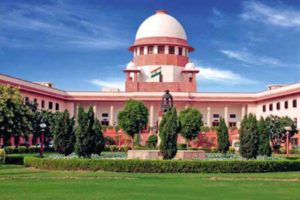
Source :supremecourtofindia.nic.in
In the recent order dated August 14, 2017, in Pradyuman bisht vs Union of India & Ors. (IA 10142/2015 arising out of Writ petition(s) (criminal) no(s). 99/2015), the Division Bench of Hon’ble Supreme Court comprising of Hon’ble Mr. Justice Adarsh Kumar Goel and Hon’ble Mr. Justice Uday Umesh Lalit, while recalling its earlier order which was initially to install CCTV cameras in two districts in every State/Union Territory, directed that it is desirable to install CCTV cameras in all subordinate courts and tribunals in such phased manner as may be considered appropriate by the High Courts. The order came on a petition moved by a man, who had sought audio-video recording of the trial proceedings of his matrimonial dispute to ensure a fair trial and that he was even willing to bear the expenses of installing such cameras.The
Hon’ble Supreme Court vide its order dated March 28, 2017 had directed, that at least two districts in every State/Union Territory (with the exception of small states/Union Territories where it may be considered to be difficult to do so by the concerned High Courts) CCTV Cameras (without audio recording) may be installed inside the courts and at such important locations of the Court complexes as may be considered appropriate. Monitor thereof may be in the Chamber of the concerned District and Session Judge. Location of the district courts and any other issues concerning the subject may be decided by the respective High Courts.
The Hon’ble Supreme Court had further clarified that the footage of the CCTV Camera will not be available under the R.T.I. and will not be supplied to anyone without permission of the concerned High Court. Further directed that the installation may be completed within three months from the date of the order and a report of such experiment be submitted within one month of such installation by the Registrar Generals of the respective High Courts to the Secretary General of the Supreme Court may have it tabulated and placed before the Supreme Court.
The Supreme Court pursuant to the said directions, has now received the reports from High Courts of Sikkim, Bombay, Andhra Pradesh, Orissa, Meghalaya, Chhattisgarh, Tripura, Punjab and Haryana, Allahabad, Patna, Rajasthan and Gauhati and noted that the CCTV cameras have already been installed in the jurisdiction of the eight High Courts while in the remaining four High Courts installation process is in progress. However, no reports have been received with regard to the remaining twelve High Courts.
Order of the Supreme Court:
- The Hon’ble Supreme Court after perusal of the report opined that, installation of CCTV Cameras will be in the interest of justice and any apprehension to the contrary needs to be repelled.
- The Court noted that the Union of India has not installed CCTV camera in Tribunals where open hearing takes place like Court such as the Income Tax Appellate Tribunal (‘ITAT’), Customs, Excise and Service Tax Appellate Tribunal (‘CESTAT’), etc., and opined that the tribunals stand on the same footing as far as objective of CCTV cameras are concerned.
- The Court advocated that the aspect of installing CCTV cameras in Tribunals, be taken up by the learned Additional Solicitor General with the concerned authorities, so that appropriate direction is issued by the concerned authority for installation of CCTV cameras in Tribunals in same manner as in Courts and an affidavit filed in the Court.
- The Court opined that recordings will help the constitutional authorities and the High Courts exercising jurisdiction under Articles 226 and 227 of the Constitution over such Tribunals.
- The Court observed that in the report there is a variance about the cost of installation of CCTV cameras and there is no uniform technical specifications which has been prescribed. Hence, the Hon’ble Supreme Court accordingly directed that the Ministry of Information and Technology in consultation with E-Committee of Supreme Court to lay down technical specifications and other modelities, including price range and sources of supply for installation of CCTV cameras in Courts.
- The Court further directed to comply with the same within the period of one month from the date of the order and directed that such information be provided to all the High Courts. Furthermore, the duration for which audio and video recordings may be retained may normally be three months, unless otherwise directed by any High Court.
- Further, the Court opined that they have already incorporated safeguards that the footage of recording will not be given for any purpose other than the purpose for which the High Court considers it appropriate and also reiterated that R.T.I provisions will not apply to CCTV camera recordings as per Order dated March 28, 2017.
Conclusion
It seems to be a significant move by the Apex Court to end the opacity and to increase the transparency in the proceedings before the Courts.

